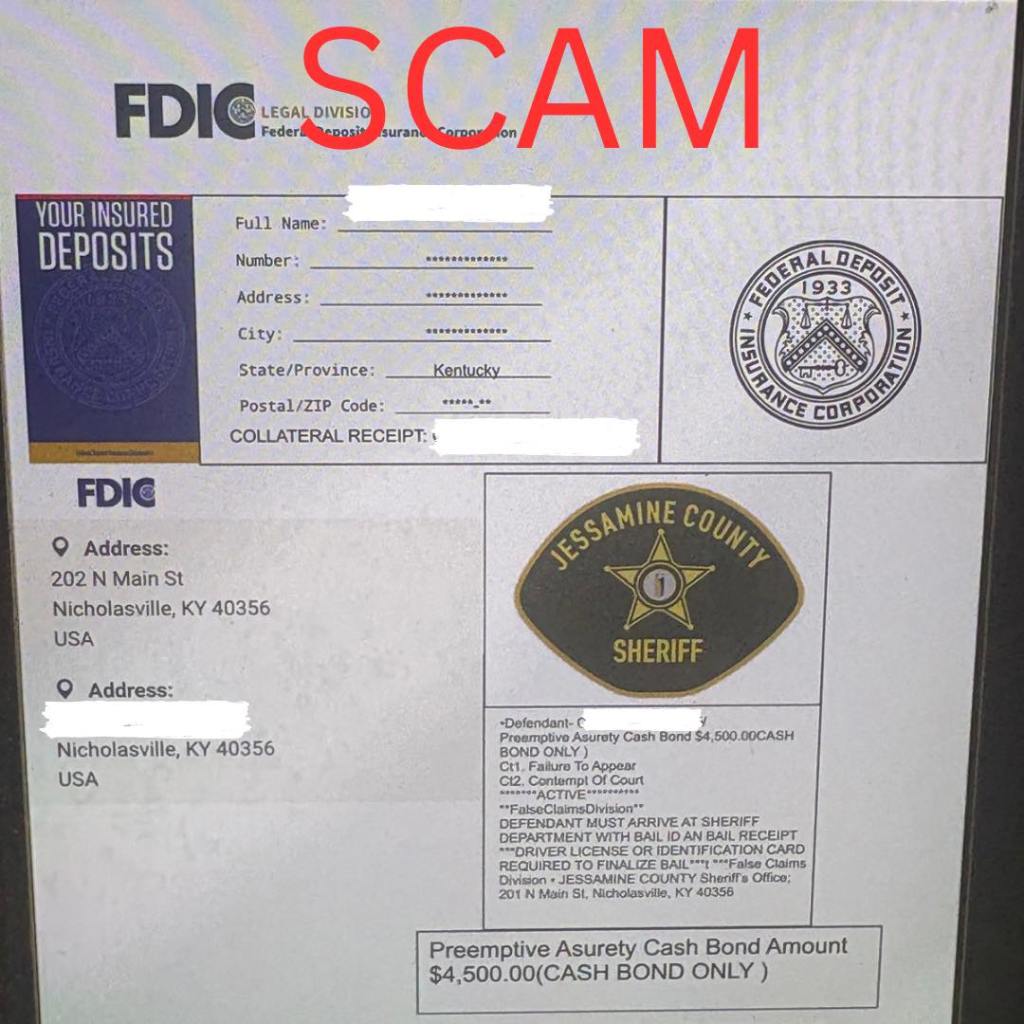Scams targeting older adults in Jessamine County
Published 8:00 am Tuesday, May 13, 2025

- (Sourced from the Jessamine County Sheriff’s Department Facebook).
|
Getting your Trinity Audio player ready...
|
Last week, over just two days, a handful of Jessamine County residents were scammed out of $60,000 that they can’t get back.
Jessamine County Sheriff’s Department Detective Matthew Lyttle said that one of these recent victims received a pop-up window on his computer that said, “Click this link. You have malware on the computer.” He clicked the link and ended up sending $25,000 in bitcoin to “fix” the issue, or so the victim believed.
Computer malware can be used with bitcoin scams, tricking users into revealing personal information or financial details, or offering payment to resolve the “malware issue.”
Trending
If you do have malware on your computer, contact tech support for the brand of your computer. Information technology technicians will not charge you for help and will never ask you to pay them through odd payment forms like Bitcoin or gift cards.
Bitcoin scams have been an issue in Jessamine County before, but Lyttle said things usually calm down for a while before the scams start picking back up again. He added that scammers are getting creative. Other than the computer virus scam, people have gotten notifications of Jury duty, property taxes, missed court dates, arrest warrants, bill collection, and requests to send money to the caller.
Lyttle said informing individuals that they have warrants for their arrest is an officer safety issue. They will not let you know unless you are friends with an officer. The Sheriff’s Department will never request money in lieu of an arrest warrant. You can’t pay off a warrant.
“It seems to be elderly people that are falling victim to this because they’re just unaware. One of the ladies sent $40,000. The bank told her, ‘No, no. Don’t do it.’ And she still did it,” Lyttle said.
Lyttle continued, “I’ve talked to [the scammers]. They’re very manipulative individuals, and they want you to get off the phone. One scammer told the victim, “If you go to the bank to get money out, don’t tell them what it’s for; just tell them you’re buying a farm,’ because he knows the bank will know this is a scam.”
A great tip for everyone is to check with your bank when you are asked to transfer money and heed the bank tellers’advice.
Trending
Lyttle has been making informative Facebook posts about the scams to keep people informed. “The property taxes are coming in the mail. That’s not normal. Last week, they cropped our badge logo and made it look legit,” he said. To pay property taxes, you can visit the Sheriff’s website at Jessaminesheriff.org or the Sheriff’s office at 201 N Main Street in Nicholasville.
Property tax requests don’t come in the mail, and the due date for property taxes is in October.
Government impersonation scams are common for Jessamine County residents. The scammers are smart and often use made-up badge and citation numbers. They’ll also use the real names of Sheriff’s department officers, local government officials, and law enforcement. According to Lyttle, they’ll even use a local law enforcement agency’s badge logo.
Lyttle said these scams are “not going away. It’ll die off and it’s quiet, then boom! We hit three or four in a week or more…We can’t do anything. I can’t even do a report for that, cause the money is gone. The only way I could get it back is if a victim calls us right after they send the money and tells the Sheriff’s Department, ‘Hey, I just deposited five grand into this bitcoin machine on this street.'” Lyttle continued, “The cash is still in that machine. The cash isn’t gone, but the problem is that Bitcoin has already sent the scammer money. They’re fronting money. That’s how Bitcoin works.” He said that this way, a victim can get their money back, and then the funds would be lost to Bitcoin, since it has already been paid out to the scammer. “Bitcoin might tighten their policies more, which would help in the long run, but that’s the only way we can get that money back.”
Hebrewseniorlife.org has several tips to protect elders from scams. Here’s a rundown of those tips to help you or the older adults in your life.
- Do not act quickly: Scams are based on urgency and pressure. Always take time to think it through and question the legitimacy of the request. If the call is high-pressure and the person claims the issue is urgent, odds are it is nefarious.
- Avoid strange payment types: Scammers often ask their victims to send them money via a wire transfer, money order, cryptocurrency like Bitcoin, a payment app, or by purchasing gift cards. Always be suspicious of demands for these odd forms of payment.
- Notice threatening behavior: If you receive threats or hostility for asking questions, that’s a sign the person is a scammer.
- Be aware of fake caller IDs: Scammers can make phone calls and send emails that look like they’re coming from legitimate government agencies, companies, or your local area code. It’s best to ignore people who contact you out of the blue. At the very least, do not share private information ever with callers, emails, or websites. When in doubt, look up a Jessamine County entity on Facebook and message the page asking if the call/mail/or email is legit. Scammers can also pretend to be a social media connection you don’t know very well, using a fake local number to contact you. You can also ask for information about the company the scammer claims to be with and check if they are registered with the Better Business Bureau.
- Again, do NOT reveal personal information.
- Always ask a trusted friend or family member or your financial institution: Before giving out your credit or banking information, ask a friend or family member if the situation seems suspicious—especially if you don’t know the person making the request. If you find yourself withdrawing money from an account or charging a large amount on a credit card, check with your bank or credit card company. Banks usually know about the latest scams.
- Add extra security to your accounts and monitor your credit.
Be sure to tell the older adults in your life about these scams and how they may be presented.





